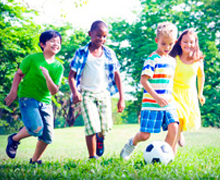
The pandemic led many children around the world to experience feelings of loneliness and isolation as they resorted to the companionship of phone and computer screens during lockdown conditions. Not surprisingly, that was confirmed as less than ideal when new research from the University of South Australia showed kids who participate in after-school activities like sports are happier than their peers glued to screens.
But it’s more than just sports. Even extracurricular activities like special interest clubs that create an environment for social interaction help kids feel better. Scientists learned that a child’s well-being is enhanced when they participate in extra-curricular activities and the opposite happens when a child spends time on social media or playing video games.
Researchers studied data from more than 60,000 students aged 4-9 and compared the number of days per week they participated in after-school activities. They then evaluated factors like happiness, sadness, worry, engagement, perseverance, optimism, emotion regulation and life satisfaction.
"Helping children develop a good sense of personal well-being is paramount in today's uncertain environment," Dr. Rosa Virgara says. "This is especially important for primary school-aged children as they're learning about the challenges and risks that full-time school can present; but it's equally important for teenagers who are facing a range of physical, social and emotional changes. Our study highlights how some out-of-school activities can boost children's well-being, while others—particularly screens—can chip away at their mental and physical health. "
Virgara went on to say, "Screens are a massive distraction for children of all ages. Most parents will attest to this. And whether children are gaming, watching TV or on social media, there's something about all screens that's damaging to their well-being."
Children from lower socio-economic backgrounds experienced positive benefits as well. Those who frequently played sports were 15% more likely to be optimistic, 14% more likely to be satisfied with their life and 10% more likely to regulate their emotions.
At the same time, kids who spent time playing video games and used social media always had lower levels of well-being. They were 11% more likely to give up on things, 9% less likely to be happy and 8% less optimistic.
"Children who were more at risk tended to come from lower socio-economic backgrounds, which indicates a clear need for greater support in these areas," Dr. Virgara says. "All in all, the message is clear—gaming, watching TV, playing on computers, and scrolling through social media are not helping build or sustain positive well-being in children.
"It's certainly a challenge, especially as most children have been brought up on devices. But if families can be more aware of the issues associated with screens, then perhaps we can find a better balance of screen time and other out-of-school activities."
